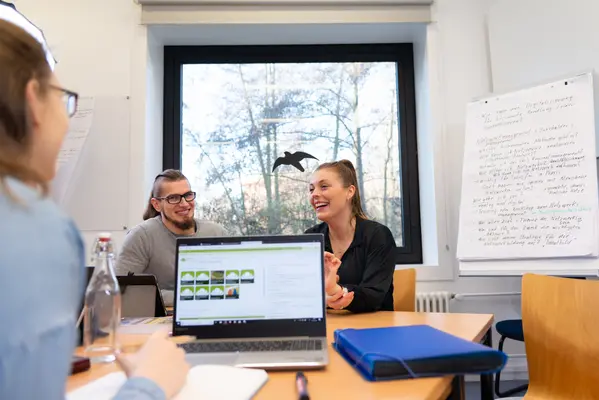Individual study contents
In the first and second semesters, you will acquire a wide range of professional, methodological and personal competences in responsible leadership. The project internship takes place in the third semester. The fourth semester is characterised by your final thesis and in-depth courses. Practical relevance and application are very important to us. Therefore, guest lectures from different industries and organisational sizes (start-ups, established companies, corporations, NGOs), semester-long projects, excursions and company visits are integrated into many courses.
Modules per semester
The team building at the beginning of the study programme focuses on getting to know each other. The various modules offer you a solid introduction to sustainable business management. The modules are offered as face-to-face studies in 13-week blocks.
You will receive an introduction to sustainable development, different concepts of sustainable business management and their elements and take part in a business game on sustainable business management and team building.
Learn about the framework conditions of the economic order, business ethics and legal foundations in the context of sustainable business.
This module introduces actors, instruments and strategies of sustainable value chain management, compliance with legal & voluntary standards, international labour standards and current sustainability issues in global supply chains and value networks.
The focus here is on getting to know and applying various creativity and moderation techniques. You will also learn to recognise and analyse conflict constellations.
Compulsory elective module 1: Application of empirical research methods
The planning, implementation, evaluation and presentation of empirical research for real clients is part of the module.
Compulsory elective module 2: Self-management
In demanding situations, you need time and stress management, personal development skills, leadership skills - and motivation. We teach you methods of self-management.
The second semester offers in-depth topics and additional opportunities for specialisation. We offer you the modules in attendance study in 10-week blocks.
The implementation of corporate environmental and sustainability management, alternative management approaches, opportunities and limitations of corporate environmental and sustainability management are dealt with in this module.
You will receive an introduction to internal and external organisational communication from a sustainability perspective. Current developments, an introduction and comparison of national and international reporting approaches are also part of our teaching content.
We show the possibilities and limits of human resource management to promote and implement a sustainable and ethically responsible corporate culture and strategy. You will learn about instruments of personnel selection, development and release.
Compulsory elective module 1: Forms of solidarity-based economic activity
"New" alternative forms of economy, cooperatives, voluntary cooperation and New Work - we teach concepts, principles and practical examples.
Compulsory elective module 2: Current topics
Courses of study can be determined by the programme director. If this is not done, choose a suitable study offer from other Master's degree programmes, the scope of which is at least 6 ECTS credit points and the content of which is meaningfully related to the objectives of the Master's degree programme in Sustainable Business Management.
Compulsory elective module 1: Sustainable consumption and production
The basics of buyer behaviour, consumer sovereignty, information asymmetry, labels and certifications - all topics of this specialisation.
Compulsory elective module 2: Management of innovation and change
Innovation dimensions, actors and processes, change management, (systemic) organisational development, self-organisation - these are the course contents here.
The focus of the third semester is the project internship, in which you work on an independent project within your internship. In addition, there is another possibility of specialisation in the course of the semester within the framework of a module in the attendance study with 2 week blocks.
Compulsory elective module 1: Sustainable start-up management
You will learn about the following topics for successful start-ups: Sustainable Entrepreneurship (entrepreneurial sustainability, start-up personality, sustainable mission statement development, employer branding, new work, situational leadership, requirements for business ideas, business models and strategies, requirements for pitch presentations); Sustainability in Financing and Investment (requirements and corporate environment of banks and investment companies with regard to the topic of "sustainability" and the corresponding fields of action).
Compulsory elective module 2: Current topics
Courses of study can be determined by the head of the degree programme. If this is not done, choose a suitable study offer from other Master's degree programmes, the scope of which is at least 6 ECTS credit points and the content of which is meaningfully related to the objectives of the Master's degree programme in Sustainable Corporate Management.
You will work on a project to develop application-related solutions for the sustainable development of companies and organisations as part of a 12-week internship.
You will be guided in an accompanying seminar with an introduction to project management, presentation of the projects (examination prerequisite) and consultations.
In the fourth semester you will work on your Master's thesis. The work is supported by the teaching of relevant research methods and an accompanying colloquium. In addition to the Master's thesis, 6-week blocks during the semester offer you further opportunities for individual specialisation as face-to-face studies.
Compulsory elective module 1: Advanced Sustainable Entrepreneurship
Deepen your knowledge of entrepreneurial and innovation-oriented behaviour of employees in organisations (intrapreneurship), human resource management for social entrepreneurs (diversity management, employability, etc.), social entrepreneurship, instruments and models for the design of structural and cultural framework conditions to promote intrapreneurship in social businesses.
Compulsory elective module 2: In-depth study of sustainability management
Case studies (discussion of integrated sustainability management systems in companies based on practical case studies), sustainability marketing (goals, tasks and instruments of sustainability marketing) can be deepened here.
Within the framework of the specialisations, one of two elective modules must be taken in each case.
By conducting the CSR Goes Live business game, you will apply study content in a practical way and specialise further.
Here you will learn research methods relevant to the Master's thesis and receive a structured introduction to working on the thesis.
Preparation of the Master's thesis (15 weeks) and accompanying colloquium (preliminary examination)




